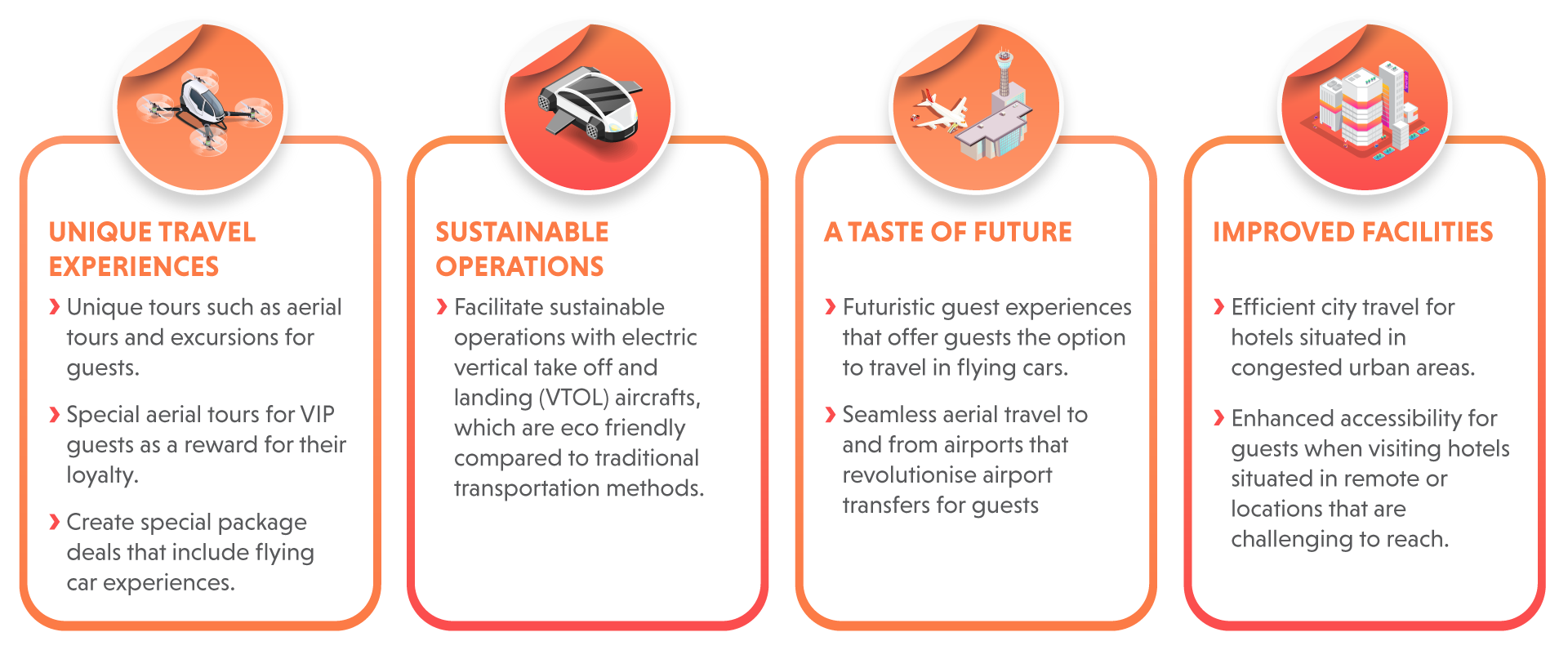Imagine flying cars whisking hotel guests to their desired destinations; a notion that feels exactly like something out of superhero fiction. Yet, the days of this being reality seem not far away.
Only a few months ago, Japanese automaker Suzuki Motor Corp announced an agreement with SkyDrive Inc. to make “flying cars”, making electric vertical take-off and landing (VTOL) aircraft. In March 2022, the two companies signed a deal to collaborate in researching, developing and marketing flying cars. While this may seem just another milestone for the automotive industry, it leaves many opportunities for supplementary sectors, including hospitality.

Flying cars in hospitality: Can hotels benefit from the new venture?
The advent of flying cars in the hospitality industry promises to revolutionise guest experiences and elevate hotel revenue.
1. Exclusive experiences
Flying cars offer a cutting-edge, luxurious mode of transportation that can be provided as an exclusive service to VIP guests. For instance, offering a premium package where guests arrive at a hotel in style and enjoy breathtaking aerial views is an offer that is hard to say no to. This one-of-a-kind experience will undoubtedly attract high-paying guests, boosting a hotel’s revenue. Flying car facilities also eliminate the hassles of traffic congestion and long travel times. This newfound speed and convenience will entice more guests to book stays, especially for quick getaways and business trips. Hotels can capitalise on this by offering enticing “fly-in” packages, allowing guests to maximise their stay in the most time-efficient manner.
2. Elevated events
Rooftop events have always been considered chic and unique, especially popular among wedding planners and other high-end events. Adding flying cars into an equation of breathtaking skyline views can enhance the value of events. Hotels can elevate their dining experiences to literal new heights by offering gourmet meals served in flying cars with panoramic views. Hotel events will take on a whole new dimension with flying cars. Think of hosting rooftop parties where guests arrive and depart in these futuristic vehicles. Weddings, conferences, and social gatherings will become even more captivating, attracting a broader audience willing to pay a premium for such extraordinary experiences.
3. Expanded accessibility
Hotels in remote or challenging-to-reach locations can now be more accessible than ever. Flying cars can efficiently transport guests to these destinations, unlocking untapped markets and attracting adventure-seeking travellers looking for unique experiences. This expanded reach translates to increased bookings and more revenue for a hotel. It further increases the accessibility to hotels and resorts for mobility-challenged guests. Guests with disabilities and other mobility issues can find a solution in flying cars, especially when accessing facilities or destinations in remote and otherwise inaccessible locations.
4. Partner collaborations
Collaborating with flying car manufacturers or rental services can lead to mutually beneficial partnerships. By offering exclusive deals on flying car transportation to a hotel, these partners can help increase the hotel’s ancillary revenue while promoting their innovative services to a broader audience. Hotels can also leverage the thrill of flying cars by offering unique add-ons and packages that include scenic aerial tours or romantic sky-high experiences. Guests will be eager to indulge in these memorable extras, adding extra revenue streams for your hotel.
How can hotels approach this novel world?
By leveraging cutting-edge technology, hotels can create seamless and tailored transportation experiences for their guests.
- Mobile apps and booking platforms: By developing a user-friendly mobile app or integrating personalised transport services into a hotel’s booking platforms, guests can request transportation at their convenience, specify preferences and track their rides in real-time.
- Ride-hailing integration: Hotels can also partner with popular ride-hailing services such as Uber or Lyft to offer guests various transportation options.
- In-app concierge: Implement an in-app concierge feature which allows guests to communicate directly with the hotel staff. Guests can use solutions such as guest engagement or guest service solutions to request transportation or other services, get details about their travel plans, book tours and receive updates.
- Internet of Things (IoT) devices: Outfitting a hotel’s vehicles with IoT devices can enhance the guest experience and provide them with a smarter and more sophisticated experience. For instance, offering Wi-Fi connectivity in vehicles will allow guests to stay connected during their journeys.
- Advanced data and analytics: A rising technology in hospitality, advanced analytics allows hotels to collect guests’ information and provide personalised transportation recommendations or offers. For instance, business analytics applications integrated with the hotel’s PMS or POS solution can identify guests’ transportation needs—such as disability accessibility or preferred mode of transport from and to airport—and ensure the guests get the transportation options that is most convenient for them.
- Language and accessibility features: Hotels and resorts can cater to international guests by offering multilingual support and real-time translation services via a transportation app. Additionally, they can ensure the vehicles are accessible to guests with disabilities, accommodating their specific needs and ensuring a wider audience can enjoy their facilities without limitations.
Flying into the future, what can we expect?
Navigating the ever-evolving landscape of the hospitality industry, hotels must seize the opportunities presented by cutting-edge technology to redefine the experiences of their guests. By implementing next-generation smart technologies, hotels can craft transportation solutions that transcend everyday functionality into something unique, attractive and profitable.
These innovations promise a future that fosters convenience, safety, and inclusivity. As hotels embrace these advancements, they not only adapt to the demands of this novel world but also set a new standard for excellence in guest service, propelling the industry forward into a dynamic and exciting future.

Author
Varadharajan Athmanathan
Vice President – Professional Services
He joined IDS Next in 2011 as a product specialist amassing an extensive understanding of hospitality technology and its use in daily hotel operations. His primary task of leading the IDS Next’s Technical Support Centre includes managing its 24/7 technical support operations.
